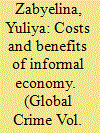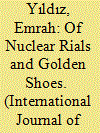| Srl | Item |
| 1 |
ID:
112630


|
|
|
|
|
| Publication |
2012.
|
| Summary/Abstract |
According to IMF and OSCE reports, informal economic transactions in Russia and other states of the former Communist Bloc have cushioned the shocks of economic and political transition of the 1990s by quickly satisfying the consumer demand and providing unofficial jobs to the population faced with transition recession. As these analyses extensively emphasise the advantages of informal entrepreneurship and its positive contribution to stimulating economic growth, this article explores the phenomenon of shuttle trade - a system/form of informal trade outside state control that does not comply with state regulations - as an issue of concern for criminologists. This article investigates the convergence of shuttle trade and criminal activities and the relationship of shuttle trade to the formal regulatory environment. It offers insights into selected criminal activities at Cherkizovsky market in Moscow before its shutdown in 2009 and an evaluation of the policymaking decisions the shutdown triggered.
|
|
|
|
|
|
|
|
|
|
|
|
|
|
|
|
| 2 |
ID:
166691


|
|
|
|
|
| Summary/Abstract |
Recent years have seen increased scholarly attention given to the issue of child soldiering. Primarily dedicated to the decision-making calculus of rebel groups, this body of work has generally emphasised supply-side versus demand-side arguments. We contribute to this growing literature by explicitly investigating a previously untested aspect of the latter. Prior scholarship has made vague references to a potential association between economic endowments and child soldiering, including natural resource wealth, but scant empirical attention has been given. We argue that the specific type of endowment has important consequences for the decision to utilise child soldiers. We argue access to and exploitation of lootable natural resources (e.g. gemstones) to be especially likely to promote the use of child soldiers due to their ease of access, the low skills required to harness them and the heightened likelihood that groups will become more profit-oriented. A systematic cross-national investigation of rebel groups provides robust evidence that lootable resources such as diamonds and gemstones are strongly associated with the use of children, while non-lootable resources such as oil are not.
|
|
|
|
|
|
|
|
|
|
|
|
|
|
|
|
| 3 |
ID:
182842


|
|
|
|
|
| Summary/Abstract |
Since the 2012 sanctions that dis-embedded the Iranian economy from global markets, contraband commerce has become an explosive issue in Iran. Increasingly Iranians came to regard sanctions as enforced by both international powers and their own state officials, who criminalized certain kinds of cross-border trade, but not others. Although Iranian state actors distinguish between the trader—praised for contributing to the economy—and the traitor—denounced for undermining its integrity—what both unites and blurs the line between them is their shared struggle with a devaluing currency that some Iranians call nuclear. This article examines the “nuclear rial” by extending insights from anthropological scholarship on money to the study of sanctions to advance a dynamic understanding of currency. Studying Iranian trade in gold proves productive for understanding how people negotiate the effects of sanctions in an unevenly financialized world. At stake in the negotiations is a conditional articulation of monetary value that relies on contingent conversions between commodities and currencies and among currencies.
|
|
|
|
|
|
|
|
|
|
|
|
|
|
|
|